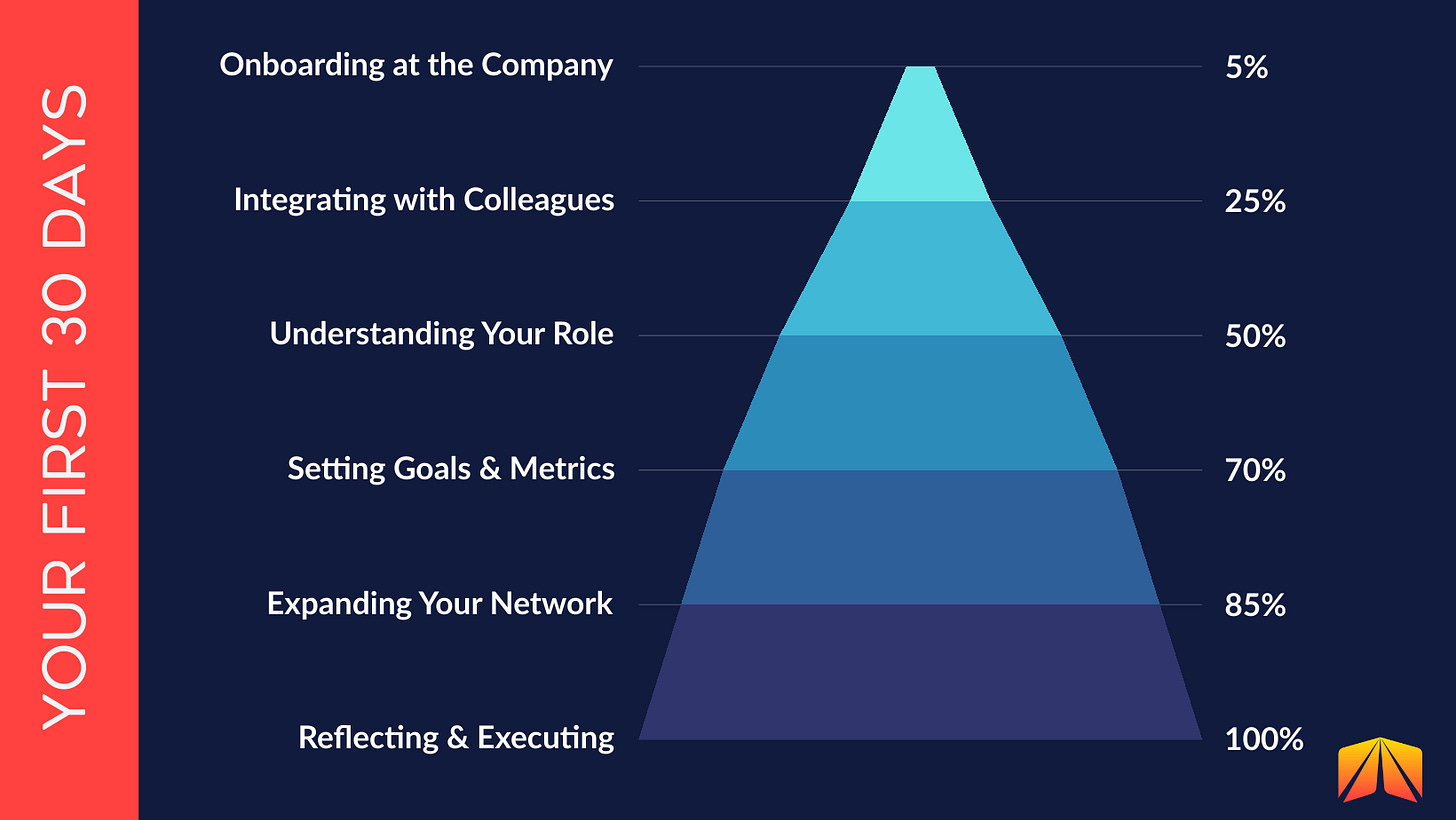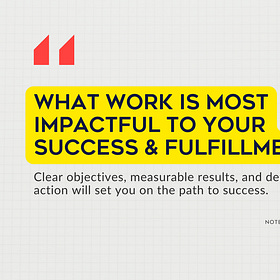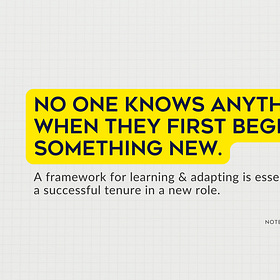On Your First Thirty Days: Understanding Your Role & Setting Goals
The key to success isn't about an early victory - it's about understanding the work ahead.
The core of your first thirty days is understanding your role, clarifying expectations, and setting the goals and objectives you need to achieve for success in your role. Some new hires miss this step completely - to their own peril.
Today, we’ll cover the next two components of your first thirty days with your new company: understanding your role & setting goals.
Step Three: Understanding Your Role
The key to success during your first thirty days is not about achieving an early victory: it’s about understanding your role within the team and the company. While your manager and recruiter documented a job description as part of the hiring process, the translation between bullet points and the actual work is essential for success.
Understanding your role will occur outside of company onboarding and integration with the team. This is typically a process that occurs with your manager and with a small group of people who perform (or performed) the same role you’re starting.
To best understand your role:
Detail the Job Description
Start with a thorough review of your job description. Note any areas that are vague or where you seek more clarity. Bring these points to your manager or your assigned onboarding buddy.
Ask questions about your role to uncover potential responsibilities that are not explicitly covered in the initial job description. The intention is to translate each and every responsibility expected in the role to the actual work you need to perform.
Meet with Your Manager
In the first thirty days, expect to meet with your manager at least twice a week. Schedule a one-on-one meeting within the first few days of onboarding to discuss your role and responsibilities. Use this opportunity to ask questions and clarify any aspects of the job description or work you’re expected to perform that are unclear.
Establish Preferred Communication Styles
Your manager and your team have preferred styles of communication and frequency of updates. Clarify how and when your manager and team prefer to receive updates, feedback, or questions.
Set Regular Check-ins for Feedback
Establish a schedule for regular one-on-one meetings with your manager. These meetings can be invaluable for reviewing progress, addressing challenges, and adjusting priorities as needed. Establish how and when feedback will be provided on your performance. Regular, constructive feedback is essential for your growth and adjustment in the new role.
Understand Company Culture and Values at a Micro-Scale
Although you gained a sense of the company culture during the interview process and early onboarding, dive deeper into how the company’s values are reflected in day-to-day operations and decision-making.
Document Agreements
After your discussions, it might be helpful to summarize the key points and expectations in an email or document. This not only provides you with a reference but also ensures that you and your manager are aligned.
Understanding your role is not a one-time task. As you grow into your role beyond your first thirty days, expectations may evolve. Maintaining open lines of communication with your manager is key to meeting and exceeding expectations. By taking the initiative to understand your role early on, you can build a strong foundation for success, satisfaction, and professional growth in your new job.
Step Four: Setting Goals & Objectives
Once you have an understanding of what your role is, it’s time to decide how to measure success and impact. These metrics should align with the goals and objectives set by your team, your department, and the business as a whole.
To set the metrics, goals, and objectives:
Clarify Expectations
Clarifying expectations at the outset of a new job is fundamental to ensuring you start on the right foot, setting the stage for success, and fostering a positive working relationship with your manager and team. It involves understanding precisely what is expected of you in terms of responsibilities, performance, and professional conduct.
Ask about the specific metrics or objectives you will be evaluated against. (These may be in the form of OKRs, KPIs, or specific measurable metrics.) Understanding these early on will help you align your work efforts with what is valued by your team and organization.
Discuss both immediate priorities and long-term goals for your position. This conversation can help you understand the broader context of your role and how it contributes to the team and company objectives.
Understand the Company’s Objectives
By understanding the broader objectives of the company and your department, you should identify the alignment to ensure your goals contribute to the overall success of the organization.
If you’re unsure about the company’s strategic goals or how your role fits into them, discuss this with your manager. Gaining clarity on these points will help you set more relevant and impactful goals.
Set and Adjust Goals with Your Manager
Discuss your proposed goals with your manager to ensure they are aligned with team and organizational objectives. Your manager can offer guidance and adjustments based on their experience and understanding of the company’s needs.
As you consider the specific metrics aligned to your goals – the measurable component of the goal – choose metrics that show, prove, or influence desired outcomes for the company. Many new employees mistake their metrics with measurements of activity or outputs or choose vanity metrics that don’t directly align with the success of the organization. Be careful not to fall into this trap.
Regularly Review Your Progress
Schedule regular check-ins with your manager to review your progress towards your goals. These discussions can provide an opportunity for feedback and adjustments to your goals as needed.
You may also be asked to provide regular updates on your metrics and goals to ensure you’re performing effectively in conjunction with the rest of the team. If you’re off-track, better to know this sooner before later.
Remain Flexible & Open to Feedback
Be prepared to revise your goals based on feedback, new opportunities, or changes within the company. Flexibility is key to staying relevant and engaged in your role.
Early and often, ask for feedback on your performance to adjust and improve quickly. Actively seeking feedback in a new job is crucial for personal and professional development. It helps you understand how your work is perceived, identifies areas for improvement, and aligns your performance with the expectations of your role and the company's goals.
Celebrate Achievements & Milestones
Take time to acknowledge and celebrate when you meet or exceed your goals. Recognizing your successes can boost your motivation and confidence.
Setting goals in your new role is not just about ticking off tasks on a list; it’s about creating a roadmap for your career development and contributions to the company. By setting smart, aligned, and meaningful goals, you can focus your efforts, measure your progress, and achieve significant milestones in your role.
Need more insight on how to set goals? Read more »
On Self-Awareness: Your Goals
Now that we've explored the foundations of who you are, let’s look ahead and set goals for what you want to achieve. Setting goals is like charting a course for a ship – it gives you clear direction and a way to measure your progress. In this section, we’ll discuss how to set meaningful goals with clear objectives, results, and actions that bring focus …
Previous Post
On Your First Thirty Days: Onboarding & Integrating into a Company
Your first thirty days in a new role comes with a mix of excitement and nervousness. This first month will set the tone for your journey ahead: it’s about making a strong first impression, learning quickly, and laying the groundwork for long-term success.







